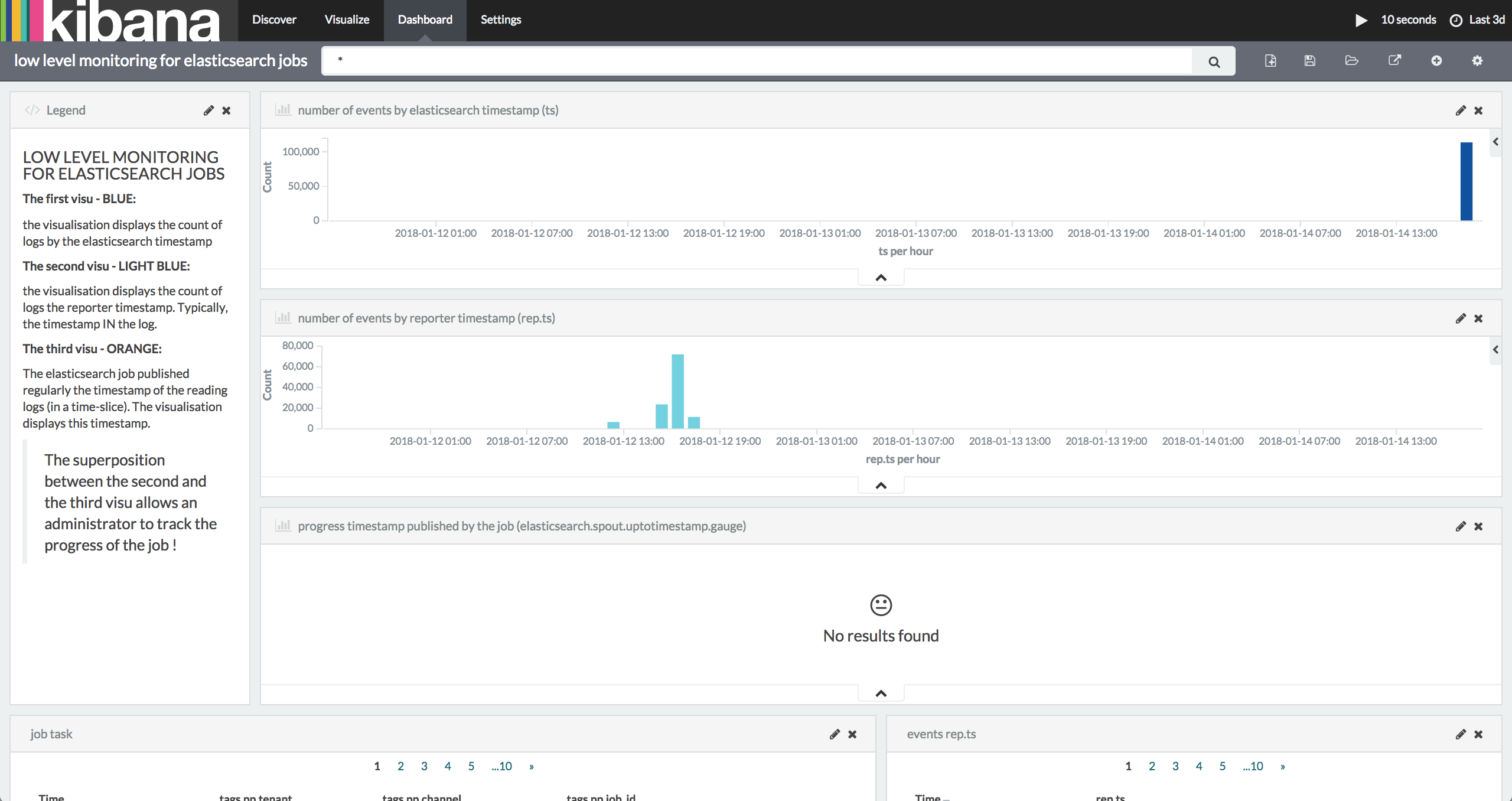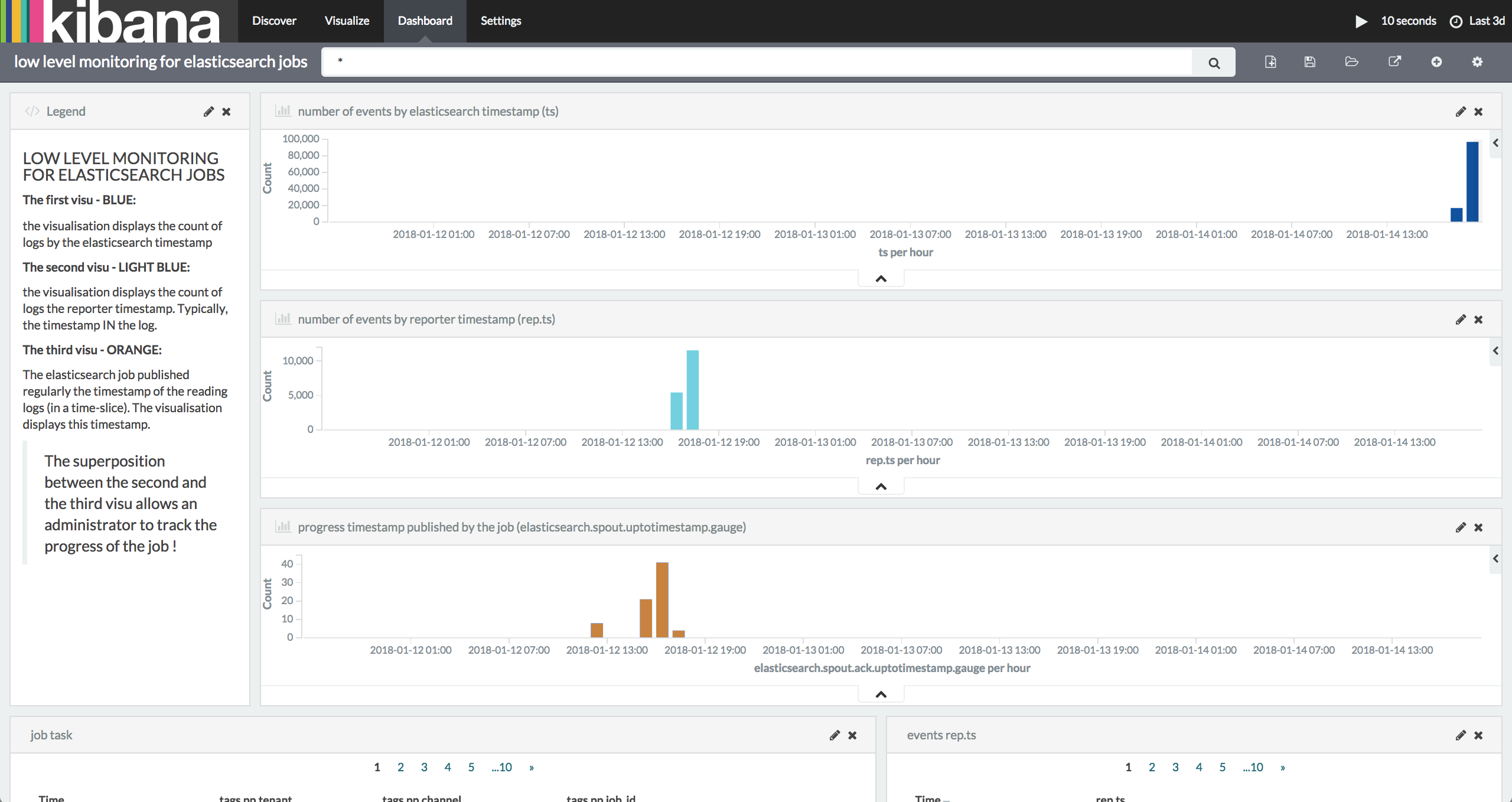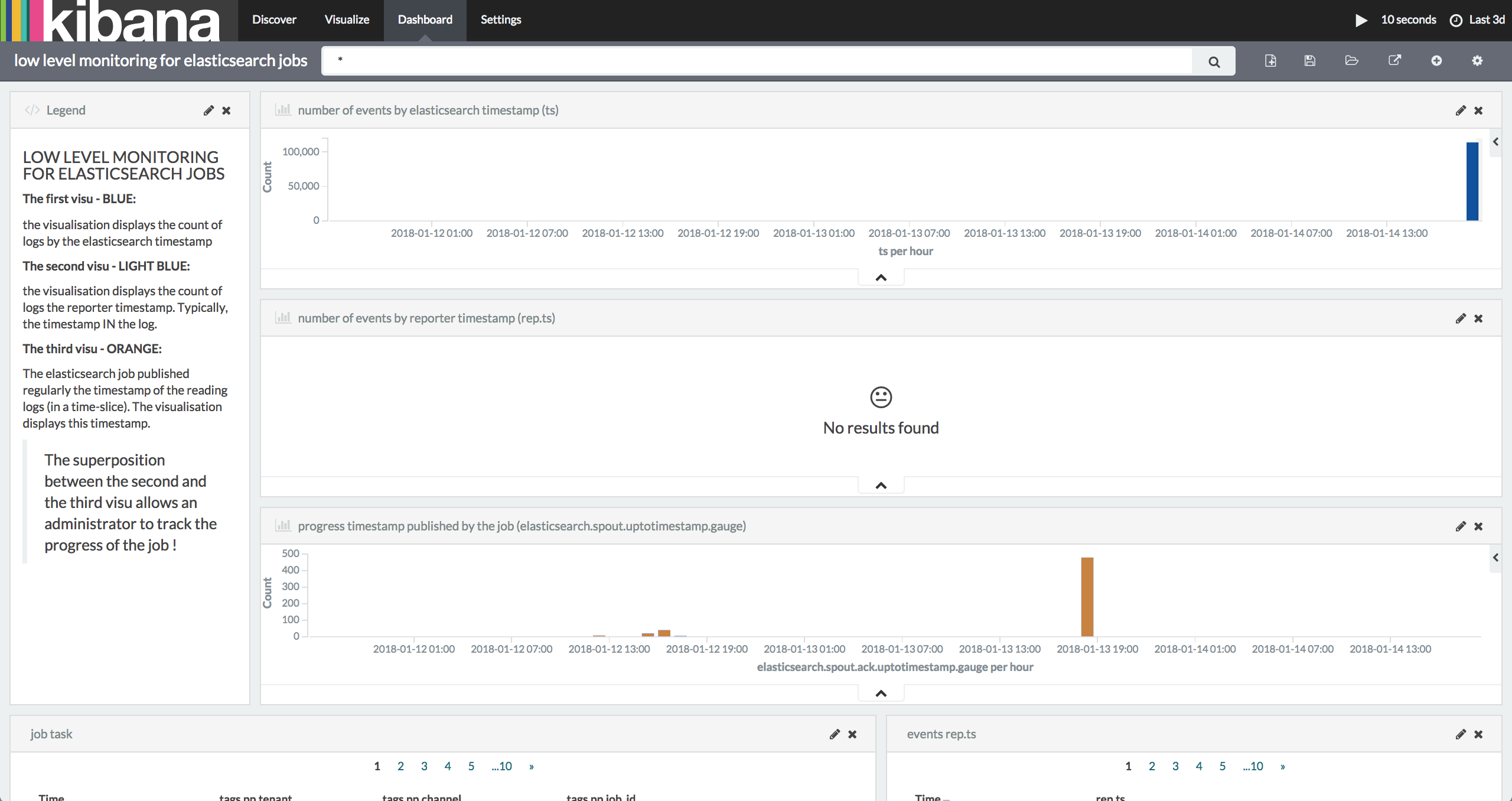HOWTO run a small change between two elasticsearch
Why do that¶
With Punchplatform, you have usually data in an Elasticsearch Cluster.
Elasticsearch provides a way to reindex data when mapping must be updated. For instance: Long to Date, or String not analyzed to analyzed String.
Sometimes, you need to update the data itself, that's why punchplatform provides a way to update the data itself. For instance: change timestamps or enrich data.
Update timestamp - use case¶
Use case description:¶
Add a year to a specific timestamp field on a subset of data.
STEP 0 - Identify data¶
Identify the subset of data with Kibana:
- timestamp range
- type of logs
- indices name
Then, read the data selected, with an Elasticsearch Spout and print the result.
The following example show an extraction of logs of all tenants logs from 2018/01/12 9h to 2018/01/13 18h with the timestamp of the reporter (rep.ts). You can start in foreground the following topology:
{
"tenant" : "mytenant",
"channel" : "replay_es",
"name" : "single",
"meta" : {
"tenant" : "mytenant",
"channel" : "replay_es",
"vendor" : "replay_es"
},
"spouts" : [
{
"type" : "extraction_input",
"settings" : {
"index" : "events-*",
"query": "?q=_type:log",
"elastic_settings" : {
"es.index.read.missing.as.empty": true
}
},
"storm_settings" : {
"component" : "extractor_spout"
}
}
],
"bolts" : [
{
"type" : punchlet_node",
"settings" : {
"punchlet_code": "{print(root);}"
},
"storm_settings" : {
"executors": 1,
"component" : punchlet_node",
"publish" : [
{
"stream" : "logs",
"fields" : [
"log",
"es_type",
"log_id",
"es_index"
]
}
],
"subscribe" : [
{
"component" : "extractor_spout",
"stream" : "default",
"grouping": "localOrShuffle"
}
]
}
},
],
"exception_catcher_bolt" : {
"punchlet" : "standard/common/exception_handler.punch",
"executors" : 1
},
"storm_settings" : {
"metrics_consumers": [ "org.apache.storm.metric.LoggingMetricsConsumer" ],
"topology.builtin.metrics.bucket.size.secs": 30,
"supervisor.monitor.frequency.secs" : 60,
"topology.max.spout.pending" : 2000,
"topology.enable.message.timeouts": true,
"topology.message.timeout.secs" : 30,
"topology.worker.childopts" : "-Xms256m -Xmx256m",
"topology.receiver.buffer.size": 32,
"topology.executor.receive.buffer.size": 16384,
"topology.executor.send.buffer.size": 16384,
"topology.transfer.buffer.size": 32,
"topology.worker.shared.thread.pool.size": 4,
"topology.disruptor.wait.strategy": "com.lmax.disruptor.BlockingWaitStrategy",
"topology.spout.wait.strategy": "org.apache.storm.spout.SleepSpoutWaitStrategy",
"topology.sleep.spout.wait.strategy.time.ms": 50,
"topology.workers" : 1
}
}
If you meet errors or issues. Check regulars errors, reread the configuration (especially index name and timestamp fields). Then, contact support-n3.punchplatform@thalesgroup.com for help.
STEP 1 - Design your process¶
Use your favorite tool to design your small processing:
- punchplatform online debugger
- punchplatform-log-injector.sh --punchlets
- punchplatform-puncher.sh
The goal is to be focused on data only. Forget elasticsearch storm etc... Punch and data focus only.
For example, I have try to add a year do a date with the online punch debugger using :
{
java.time.ZonedDateTime date = java.time.ZonedDateTime.parse("2018-01-11T15:05:00+01:00", java.time.format.DateTimeFormatter.ISO_OFFSET_DATE_TIME);
[initialDate] = date.toString();
java.time.Period year = java.time.Period.ofYears(1);
java.time.ZonedDateTime datePlusYear = date.plus(year);
[datePlusYear] = datePlusYear.toString();
print(root);
}
Then, write your processing in a punch. For my example, it looks like:
{
// get date from logs ie [logs][log][rep][ts]
java.time.ZonedDateTime date = java.time.ZonedDateTime.parse([logs][log][rep][ts].toString(), java.time.format.DateTimeFormatter.ISO_OFFSET_DATE_TIME);
//[initialDate] = date.toString();
// define 1 year, no matter leap year or not
java.time.Period year = java.time.Period.ofYears(1);
// add 1 year
java.time.ZonedDateTime datePlusYear = date.plus(year);
// update [logs][log][rep][ts] with the updated date
[logs][log][rep][ts] = datePlusYear.toString();
}
STEP 2 - Start your processing in production¶
Assemble the reading component, the processing component and the last component, the writing component, like the following example:
{
"tenant" : "mytenant",
"channel" : "replay_es",
"name" : "single",
"meta" : {
"tenant" : "mytenant",
"channel" : "replay_es",
"vendor" : "replay_es"
},
"spouts" : [
{
"type" : "elasticsearch_input",
"settings" : {
"es_client_type" : "client",
"es_cluster_name" : "es_search",
"es_cluster_nodes_and_ports" : "localhost:9300",
"index_name" : "events-mytenant-*",
"from_datetime" : "2018-01-12T09:00:00+0100",
"to_datetime" : "2018-01-13T18:00:00+0100",
"timestamp_field" : "rep.ts",
"timeslice_size_ms" : 60000,
"filtering_request" : "_type:",
"es_id_storm_output_field_name" : "log_id",
"es_type_storm_output_field_name" : "es_type",
"es_document_storm_output_field_name" : "log",
"es_index_storm_output_field_name" : "es_index"
},
"storm_settings" : {
"executors": 1,
"component" : "extractor_spout",
"publish" : [
{
"stream" : "logs" ,
"fields" : ["log","es_type", "log_id", "es_index"]
}
]
}
}
],
"bolts" : [
{
"type" : punchlet_node",
"settings" : {
"punchlet_json_resources" : [],
"punchlet" : [
"replay_es/removeTs.punch",
"replay_es/plusOneYear.punch"
]
},
"storm_settings" : {
"executors": 1,
"component" : punchlet_node",
"publish" : [
{
"stream" : "logs",
"fields" : [
"log",
"es_type",
"log_id",
"es_index"
]
}
],
"subscribe" : [
{
"component" : "extractor_spout",
"stream" : "logs",
"grouping": "localOrShuffle"
}
]
}
},
{
"type": "elasticsearch_bolt",
"settings": {
"cluster_id": "es_search",
"per_stream_settings" : [
{
"stream" : "logs",
"index" : { "type" : "daily" , "prefix" : "events-%{tenant}-" },
"document_json_field" : "log",
"document_id_field" : "log_id",
}
]
},
"storm_settings": {
"component": "elasticsearch",
"subscribe": [ { "component": punchlet_node", "stream": "logs", "grouping" : "localOrShuffle" } ]
}
}
],
"metrics" : {
"reporters" : [
{
"type" : "elasticsearch",
"cluster_name" : "es_search",
"transport" :
"localhost:9300",
"max_results_size" : 10000,
"native_es_settings" : {
"transport.netty.workerCount" : "1"
},
"reporting_interval" : 1
}
]
},
"exception_catcher_bolt" : {
"punchlet" : "standard/common/exception_handler.punch",
"executors" : 1
},
"storm_settings" : {
"metrics_consumers": [ "org.apache.storm.metric.LoggingMetricsConsumer" ],
"topology.builtin.metrics.bucket.size.secs": 30,
"supervisor.monitor.frequency.secs" : 60,
"topology.max.spout.pending" : 2000,
"topology.enable.message.timeouts": true,
"topology.message.timeout.secs" : 30,
"topology.worker.childopts" : "-Xms256m -Xmx256m",
"topology.receiver.buffer.size": 32,
"topology.executor.receive.buffer.size": 16384,
"topology.executor.send.buffer.size": 16384,
"topology.transfer.buffer.size": 32,
"topology.worker.shared.thread.pool.size": 4,
"topology.disruptor.wait.strategy": "com.lmax.disruptor.BlockingWaitStrategy",
"topology.spout.wait.strategy": "org.apache.storm.spout.SleepSpoutWaitStrategy",
"topology.sleep.spout.wait.strategy.time.ms": 50,
"topology.workers" : 1
}
}
We have to start in a cluster, so we need a channel_structure like this:
{
"topologies" : [
{
"topology" : "single_topology.json",
"execution_mode" : "cluster",
"cluster" : "main",
"reload_action" : "kill_then_start"
}
],
"autotest_latency_control" : {
"path_controls" : {
"to_elasticsearch" : {
"input" : {
"pp_platform_id" : "punchplatform-primary",
"tenant_name" : "mytenant",
"channel_name" : "replay_es",
"topology_name" : "single",
"storm_container_id" : "main",
"component_name" : "extractor_spout"
},
"output" : {
"pp_platform_id" : "punchplatform-primary",
"tenant_name" : "mytenant",
"channel_name" : "replay_es",
"topology_name" : "single",
"storm_container_id" : "main",
"component_name" : "elasticsearch"
},
"warn_threshold_s" : 2,
"error_threshold_s" : 4
}
}
},
"metrics" : {
"metrics_source" : {
"configuration" : {
"type" : "elasticsearch",
"cluster_name" : "es_search",
"transport" : "localhost:9300",
"native_es_settings" : {
"transport.netty.workerCount" : "1"
}
}
}
},
"kafka_topics" : {}
}
To start, simply run:
channelctl start --channel replay_es
STEP 3 - Administrate and Monitor¶
Punchplatform provides several way to monitor the kind of processing.
To monitor the high level of the job:
- Channels tab in punchplatform admin to see latency control health
- Jobs tab in punchplatform admin to see the health and a high level progress.
- punchplatform-jobs.sh command
To monitor the low level of the job:
- Punchplatform provides metrics and dashboard components (elasticsearch&kibana)
- Create a dashboard to understand the processing in your job.
For example:
Before starting job:

During the job:

At the end of the job:

